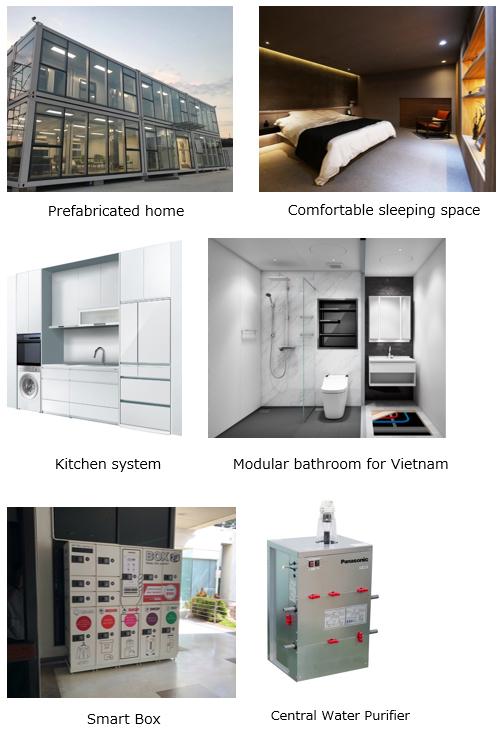
Feb 04, 2026
- Company
- Press Releases
- Operating Company
Feb 06, 2020
Company / Press Releases
The company strives to become leader in complete electric components production
and housing solutions

Osaka, Japan - Panasonic Corporation unveiled a three-pronged strategy to grow its electronic components and housing materials business in Southeast Asia as the company enters a new fiscal year on April 1, 2020. The strategy, which will be initiated by Panasonic's Life Solutions Company in the new fiscal year, focuses on customers, business partners and society, with the aim to reach 100 billion yen in the region's sales in the fiscal year ending March 2022.
Daizo Ito, Senior Vice President and Director of Global Marketing Division of Life Solutions Company, said that it is strengthening marketing strategies in the coming business year to drive the growth of electric components and housing materials businesses in Southeast Asia. The strategic plans are aimed at enhancing customer relationships, developing new businesses through partnerships, and introducing new solutions that help solve social issues. Through these approaches, Panasonic targets sales of 100 billion yen in Southeast Asia in the fiscal year through March 2022.
"Recent data showed that the growing population and rise in income have been driving construction sectors in the Southeast Asia region. It is expected that the population in five ASEAN nations, namely Indonesia, the Philippines, Thailand, Vietnam and Malaysia, will increase from 580 million in 2020 to 640 million in 2030. Meanwhile, the number of new housing starts in these countries is projected to reach 4.41 million units in 2021, or five times higher than the figures in Japan," said Mr. Ito.
The following are the three strategic points Panasonic pursues in Southeast Asia:
– The company aims to be a complete integrated manufacturer of electrical components by increasing product variety and strengthening human resources.
Panasonic has been leading Japan's electric components industry by constantly developing value-added products, such as lighting equipment, wiring devices and ventilating fans, as well as building strong sales network. In Southeast Asia, where the company has a strong presence especially in the segment of wiring devices, Panasonic aims to be a complete electric components provider by adapting strategies and knowledge cultivated in Japan, expanding sales through local partnerships, increasing product variety, and strengthening human resources. Panasonic will also foster collaboration within its affiliates to offer safer, more convenient and more comfortable living spaces, for example, a "learning space" to enable effective learning and reading activities, as well as a "comfortable sleeping space" that helps people wake up more refreshed.
– The company aims to penetrate into the kitchen and housing materials market through cooperation with local partners in each country.
Panasonic's Housing Systems Business Division will enter the home appliance markets in Southeast Asia in earnest by taking advantage of its cutting-edge technologies, expertise, and experiences cultivated in Japan.
The company is committed to engaging in the development of living space in Southeast Asia through partnerships with local companies in each country. In particular, the company will place a focus on developing and introducing packaged housing systems, such as module kitchens and modular bathrooms, to offer consistency in quality and other benefits including easy and time-saving installations. In Thailand, the company is joining hands with a local locker services provider to pilot an IoT-enabled "Smart Box" parcel delivery box that can be operated remotely via a smartphone.
– The company aims to expand markets of prefabricated homes and Central Water Purifier.
The Southeast Asia region is faced with social issues, such as health, labor shortages and an aging population. Panasonic has been inventing solutions to help mitigate and solve these problems. Concerning health issues, the company has developed air and water purifiers, including a Central Water Purifier, to help make living healthy. As for labor shortages, the company will introduce in the Southeast Asia market prefabricated apartments and homes, designed to reduce construction time, lessen the workload, and improve the quality of construction work. These prefabricated homes were introduced in China last year and gained positive feedback from the construction market. For issues associated with aging population, Panasonic will propose The Shower, a comfortable bath with a seat where users can sit down while taking a shower, and Resyone, a robotic bed to improve autonomy and independence of the elderly - both of which have been available in Japan.
As a leader in the electric components and housing materials field, Panasonic continues to provide solutions that elevate the value of living space by combining knowhow and technologies the company has developed in engineering, manufacturing and sales.
Panasonic Corporation is a worldwide leader in the development of diverse electronics technologies and solutions for customers in the consumer electronics, housing, automotive, and B2B businesses. The company, which celebrated its 100th anniversary in 2018, has expanded globally and now operates 582 subsidiaries and 87 associated companies worldwide, recording consolidated net sales of 8.003 trillion yen for the year ended March 31, 2019. Committed to pursuing new value through innovation across divisional lines, the company uses its technologies to create a better life and a better world for its customers. To learn more about Panasonic: https://www.panasonic.com/global.
The content in this website is accurate at the time of publication but may be subject to change without notice.
Please note therefore that these documents may not always contain the most up-to-date information.
Please note that German, Spanish and Chinese versions are machine translations, so the quality and accuracy may vary.